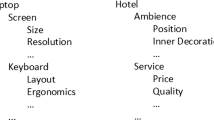Abstract
Aspect level sentiment analysis has received much attention by researchers over the last few years. It aims first to determine the aspects in a given text (e.g., a comment, a sentence, a review, etc.) and second to perform the sentiment analysis (i.e., determine the polarity, such as positive, negative, or neutral) of the corresponding text with respect to each aspect. In this paper, we propose an original method of sentiment analysis for Tunisian social media. Our method is mainly based on domain ontologies for aspect extraction and deep learning models for aspect sentiment classification. Evaluation results are very encouraging, since we outperformed the baseline method with an enhancement of 17% for the task of aspect level sentiment classification.



Similar content being viewed by others
Data availability
All data will be soon accessible to the community via the following link: https://sites.google.com/site/anlprg/corpora-corpus.
References
Rahman H, Tariq J, Masood MA, Subahi AF, Khalaf OI, Alotaibi Y. Multi-tier sentiment analysis of social media text using supervised machine learning. Comput Mater Contin. 2023;74:5527–43.
Tun Thura Thet, Na J-C, Khoo CSG. Aspect-based sentiment analysis of movie reviews on discussion boards. J Inf Sci. 2010;36:823–48. https://doi.org/10.1177/0165551510388123.
Matin Pour AA, Jalili S. Aspects extraction for aspect level opinion analysis based on deep CNN. In: 2021 26th International Computer Conference, Computer Society of Iran (CSICC). 2021; p. 1–6. IEEE, Tehran, Iran.
Samha KA, Li Y, Zhang J. Aspect-based opinion extraction from customer reviews. In: Computer Science & Information Technology ( CS & IT ). 2014; pp. 149–160. Academy & Industry Research Collaboration Center (AIRCC).
Mowlaei ME, Saniee Abadeh M, Keshavarz H. Aspect-based sentiment analysis using adaptive aspect-based lexicons. Expert Syst Appl. 2020;148: 113234.
Chen J, Wang R, Fang B, Zuo C. Fine-grained aspect-based opinion mining on online course reviews for feedback analysis. Interact Learn Environ. 2023;33:1–16.
Tamrakar S, Bal BK, Thapa RB. Aspect based sentiment analysis of Nepali text using support vector machine and Naive Bayes. Tech J. 2020;2:22–9.
Mubarok MS, Adiwijaya Aldhi MD. Aspect-based sentiment analysis to review products using Naïve Bayes. In: Presented at the International Conference on mathematics: pure, applied and computation: empowering engineering using mathematics, Surabaya, Indonesia (2017).
Khamphakdee N, Seresangtakul P. An efficient deep learning for Thai sentiment analysis. Data. 2023;8:90. https://doi.org/10.3390/data8050090.
Al-Dabet S, Tedmori S, Al-Smadi M. Extracting opinion targets using attention-based neural model. SN Comput Sci. 2020;1:242.
Abdelgwad MM, Soliman THA, Taloba AI, Farghaly MF. Arabic aspect based sentiment analysis using bidirectional GRU based models. J King Saud Univ Comput Inform Sci. 2021;34(9):6652–62.
Al-Smadi M, Talafha B, Al-Ayyoub M, Jararweh Y. Using long short-term memory deep neural networks for aspect-based sentiment analysis of Arabic re-views. Int J Mach Learn Cybern. 2019;10:2163–75.
Mai L, Le B. Joint sentence and aspect-level sentiment analysis of product comments. Ann Oper Res. 2021;300:493–513.
Belguith M, Aloulou C, Gargouri B. Building domain ontologies for Tunisian dialect: towards aspect sentiment analysis from social media. In: ISPR’ 2023, Hammamet, Tunisia.
Masmoudi A, Hamdi J, Hadrich Belguith L. Deep learning for sentiment analysis of Tunisian dialect. CyS. 2021. https://doi.org/10.13053/cys-25-1-3472.
Mekki A, Zribi I, Ellouze M, Belguith HL. Treebank creation and parser generation for Tunisian social media text. In: 2020 IEEE/ACS 17th International Conference on computer systems and applications (AICCSA). 2020; pp. 1–8. IEEE, Antalya, Turkey. https://doi.org/10.1109/AICCSA50499.2020.9316462.
Schouten K, Frasincar F, de Jong F. Ontology-enhanced aspect-based sentiment analysis. In: Cabot J, De Virgilio R, Torlone R, editors. Web engineering. Cham: Springer International Publishing; 2017. p. 302–20.
Thakor P, Sasi S. Ontology-based sentiment analysis process for social media content. Proc Comput Sci. 2015;53:199–207.
Hochreiter S, Schmidhuber J. Long short-term memory. Neural Comput. 1997;9:1735–80. https://doi.org/10.1162/neco.1997.9.8.1735.
ArunKumar KE, Kalaga DV, Mohan Sai Kumar CH, Kawaji M, Brenza TM. Comparative analysis of Gated Recurrent Units (GRU), long Short-Term memory (LSTM) cells, autoregressive Integrated moving average (ARIMA), seasonal autoregressive Integrated moving average (SARIMA) for forecasting COVID-19 trends. Alex Eng J. 2022;61:7585–603.
Cho K, van Merrienboer B, Gulcehre C, Bahdanau D, Bougares F, Schwenk H, Bengio Y. Learning phrase representations using RNN encoder-decoder for statistical machine translation. 2014. arXiv:1406.1078 [cs, stat].
Belguith M, Azaiez N, Aloulou C, Gargouri B. Social Media sentiment classification for Tunisian Dialect: a deep learning approach. ISPR’ 2022, Hammamet, Tunisia.
Author information
Authors and Affiliations
Corresponding author
Ethics declarations
Conflict of Interest
All authors declare that they have no conflict of interest.
Research Involving Human Participants and/or Animals
All procedures performed in studies involving human participants were in accordance with the ethical standards of the institutional and/or national research committee and with the 1964 Helsinki declaration and its later amendments or comparable ethical standards. This article does not contain any studies with animals performed by any of the authors.
Informed Consent
Our Dataset is composed of comments in Tunisian dialect. These comments are collected from social media (Facebook and YouTube). All sensitive and personalized content was removed for users’ privacy concerns.
Additional information
Publisher's Note
Springer Nature remains neutral with regard to jurisdictional claims in published maps and institutional affiliations.
Rights and permissions
Springer Nature or its licensor (e.g. a society or other partner) holds exclusive rights to this article under a publishing agreement with the author(s) or other rightsholder(s); author self-archiving of the accepted manuscript version of this article is solely governed by the terms of such publishing agreement and applicable law.
About this article
Cite this article
Belguith, M., Aloulou, C. & Gargouri, B. Aspect Level Sentiment Analysis Based on Deep Learning and Ontologies. SN COMPUT. SCI. 5, 58 (2024). https://doi.org/10.1007/s42979-023-02362-3
Received:
Accepted:
Published:
DOI: https://doi.org/10.1007/s42979-023-02362-3




